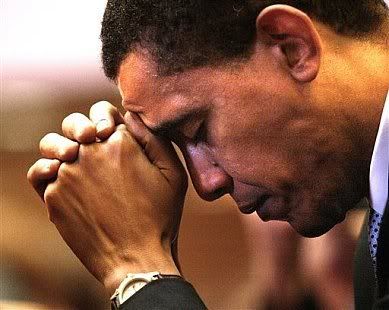 How Barack Obama Became Mr. Unpopular
How Barack Obama Became Mr. Unpopular
Michael Scherer, Sept. 02, 2010, Time Magazine
A couple of weeks back and a dozen miles west of Elkhart, hundreds gathered in another school gym – except this time it was for a job fair. With the local unemployment rate above 12% and rising again this summer, about a third of the employer display tables stood empty. Julie Griffin, who voted for Obama in ’08, sat down at the room’s edge, well dressed and discouraged. After 23 years as a payroll administrator at a local RV plant, she got laid off 18 months ago. “Really, what has he been doing?” she said when I asked about Obama’s efforts to help people like her. “I guess I don’t know what he is doing.”
[snip]
This shift in perception – from Obama as political savior to Obama as creature of Washington – can be seen elsewhere. When Obama arrived in office in January ’09, his Gallup approval rating stood at 68%, a high for a newly elected leader not seen since John Kennedy in 1961. Today Obama’s job approval has been hovering in the mid-40s, which means that at least 1 in 4 Americans has changed his or her mind. The plunge has been particularly dramatic among independents, whites and those under age 30. With midterm elections just nine weeks off, instead of the generational transformation some Democrats predicted after 2008, the President’s party teeters on the brink of a broad setback in November, including the possible loss of both houses of Congress. By a 10-point margin, people say they will vote for Republicans over Democrats in Congress, the largest such gap ever recorded by Gallup.
White House aides explain this change as a largely inevitable reflection of the cycles of history. Midterms are almost always bad for first-term Presidents, and worse in hard times. “The public is rightly frustrated and angry with the economy,” says Dan Pfeiffer, Obama’s communications director, explaining the White House line. “There is no small tactical shift we could have made at any point that would have solved that problem.” In more confiding moments, aides admit that the peak of Obama’s popularity may have been inflated, a fleeting result of elation at the prospect of change and national pride in electing the first African-American President. As one White House aide puts it, “It was sort of fake.”
But while these explanations may be valid, they are also incomplete. A sense of disappointment, bordering on betrayal, has been growing across the country, especially in moderate states like Indiana, where people now openly say they didn’t quite understand the President they voted for in 2008. The fear most often expressed is that Obama is taking the country somewhere they don’t want to go. “We bought what he said. He offered a lot of hope,” says Fred Ferlic, an Obama voter and orthopedic surgeon in South Bend who has since soured on his choice. Ferlic talks about the messy compromises in health care reform, his sense of an inhospitable business climate and the growth of government spending under Obama. “He’s trying to Europeanize us, and the Europeans are going the other way,” continues Ferlic, a former Democratic campaign donor who plans to vote Republican this year. “The entire American spirit is being broken.”

1 comments
Author
Maybe you could try bipartisanship with liberals and independents and the nearly 20 percent of the country now unemployed, for a change, if you want Democrats to retain a congressional majority in November?